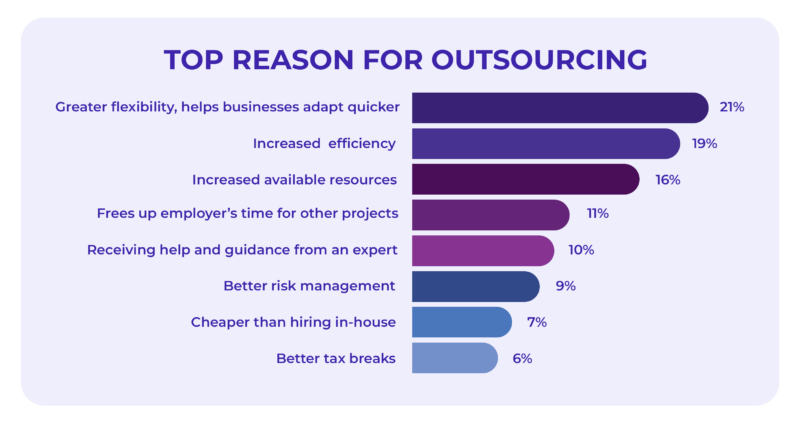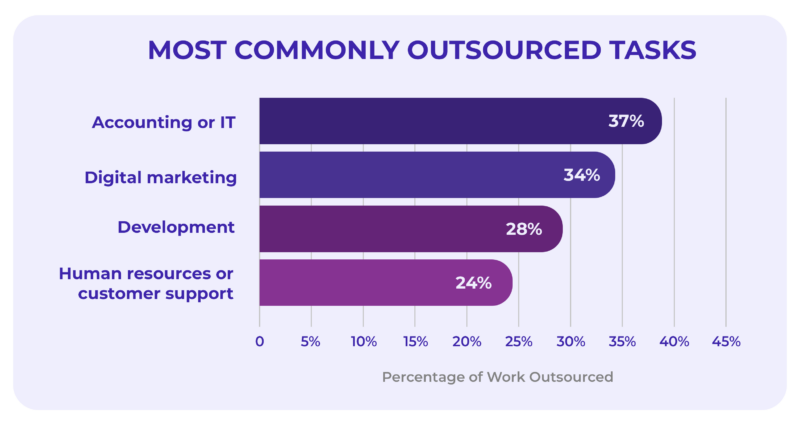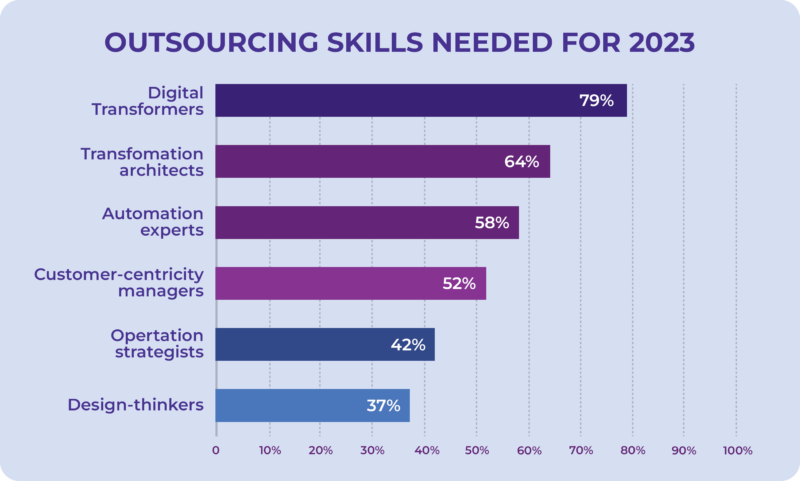In today’s rapidly evolving business landscape, achieving scalability is a paramount goal for organizations seeking to thrive and remain competitive. Outsourcing emerges as a pivotal strategy in this pursuit, offering a pathway to enhanced efficiency achieve scalability, cost-effectiveness, scalability, access to specialized external expertise and, and the ability to focus on core strengths.
By tapping into the capabilities core competencies, and resources of external service providers, businesses using outsourcing can help propel their growth, bolster their competitive edge, enhance scalability, and elevate customer satisfaction. However, realizing the full benefits of outsourcing necessitates meticulous planning, thoughtful vendor selection, transparent communication, robust data security measures, and vigilant performance monitoring. Consideration of cultural and language factors, coupled with robust change management strategies, is equally vital.
In this dynamic marketplace, where demands continually evolve, outsourcing stands as a strategic solution outsourcing enables businesses to meet the challenges of growth, broaden capabilities, and foster innovation. The strategic embrace of outsourcing empowers organizations to fully unleash their potential, optimize resource allocation, and position themselves for enduring success. Through judicious management of their outsourcing partner relationships, strategic initiatives, careful planning, and a focus on careful consideration, outsourcing enables businesses that can seize growth opportunities, enhance operational efficiency, and maintain a competitive edge.
Significance of scalability and business growth
In the present competitive business environment, companies are continually searching for innovative approaches to drive their expansion and drive growth further. One notably prominent strategy is outsourcing non core tasks, which involves delegating specific tasks or functions to external experts or service providers. This practice empowers businesses to concentrate on their core strengths and propel overall expansion. This article delves into the pivotal role played by outsourcing non core functions in fostering business growth and expansion. It underscores both the role of outsourcing in scalability and business growth advantages it offers and shares success stories of companies that have embraced this transformative method. Enhancing Operational Efficiency and Productivity: Outsourcing non-core responsibilities allows businesses to deploy their resources more effectively, thereby maximizing productivity. Delegating repetitive or time-consuming tasks to external specialists streamlines operations, reduces bottlenecks, and bolsters overall efficiency.
Access to Specialized Proficiency:
Outsourcing grants businesses access to a wealth of very specialized skills, experienced professionals, and specialized expertise, that may not be readily available in-house. Whether outsourcing helps a business as it pertains to IT development, digital marketing, customer support, or accounting services, outsourcing enables companies to tap into an extensive talent pool and leverage the capabilities of industry specialists.
Cost Reduction and Scalability:
Outsourcing offers substantial cost-saving benefits, especially concerning labor and infrastructure expenditures. By opting for outsourcing, businesses can economize and save money on recruitment and training expenses, employee benefits, office space, and equipment costs. Furthermore for long term growth, outsourcing facilitates scalability, and market expansion, reducing costs and allowing companies to effortlessly adjust their business operations to align with evolving requirements and market dynamics.
Strategic Emphasis on Core Competencies:
Outsourcing empowers businesses to refocus, focus on their core competencies, human resources, and efforts on their fundamental strengths. Through the delegation of non core tasks to outsourcing partners, companies can allocate more time, energy, and resources to focus on core and endeavors critical functions that directly contribute to their competitive edge and long-term advancement.

Role of Outsourcing in Scalability
During peak business seasons, the necessity of providing robust support for online orders and inquiries becomes paramount. Yet, the feasibility operational costs of acquiring technology, recruiting, and training a customer service team for non essential tasks of managing incoming calls may raise doubts. Thankfully, outsourcing these responsibilities from the business process outsourcing and internal customer base team to a contact center offers a practical solution. Contact centers boast a roster of pre-trained agents adept at handling incoming calls and collecting essential customer data.
Outsourcing grants businesses the flexibility to rapidly expand their operations by using more employees or tapping into an existing, skilled workforce capable of managing increased workloads. Depending on the contact center company’s operations size and the specific needs of retailers or e-commerce firms, onboarding as many as 100 call center agents can be accomplished in a matter of days or weeks. Conversely, when the peak season subsides, downsizing sales team to a smaller agent group or full time employees is equally straightforward. In scenarios where temporary support is required, contact centers excel in delivering precisely that – short-term assistance.
Optimizing Scalability through Outsourcing:
1. Develop a clear plan:
Create a straightforward strategy that outlines your company’s goals, needs, and starting timeline. This helps prioritize tasks even non core functions and assigns them to the internal team or teams or the right team or individuals.
2. Carefully choose service providers:
Before selecting the cheapest option, thoroughly research potential service providers to ensure they have the necessary expertise and experience for your project.
3. Establish effective communication:
Communication is vital for a successful business in outsourcing business scaling up. Ensure everyone knows their roles and responsibilities in outsourcing journey and set up clear communication channels from the outsourcing partner from the beginning.C. How outsourcing supports scalability
4. Evaluate Your Company’s Needs for ROI Optimization
Assess your the core competencies for business needs before outsourcing to maximize labor costs for ROI.
Select the right provider and negotiate a mutually beneficial contract.
5. Identifying Tasks/Functions for Outsourcing
- Determine which roles offer the most advantages for outsourcing.
- Focus on tasks that are not closely tied to your other core business functions.
- Consider business challenges, required skills, business processes and customer pain points.
6. Break Down Tasks/Functions into Projects
- Simplify outsourcing by breaking tasks into projects.
- Develop a clear plan outlining project goals and execution.
- Categorize tasks into projects for clarity and reduced misunderstandings.
7. Identifying Potential Outsourcing Partners
- Choose outsourcing partners tailored to your unique requirements.
- Examine reputation, credentials, and infrastructure.
- Ask about track record, talent access, technology, and security measures.
8. Implement Your Business Plan
- Focus on achieving sustainable growth through business process outsourcing alone.
- Define success metrics, address challenges, and plan for flexibility.
- Continuously improve and adapt your business plan
The Role of Outsourcing in Business Growth
Benefits of Outsourcing for Business Growth
1. Focus on core matters:
- Outsourcing enables companies to concentrate on customers and utilize internal resources for growth.
2. Cost savings:
- It provides cost savings by reducing employment expenses such as recruitment, salaries, and benefits.
- No employment taxes are incurred, and employee benefits packages are not required for outsourced staff.
3. Reduced overhead cost
- Outsourced employees often have their own equipment and workspace, reducing overhead costs.
4. Efficiency through Outsourcing
- Outsourcing allows businesses to allocate resources to revenue-generating areas like sales and marketing.
- Routine tasks such as bookkeeping, customer service, and data entry can be outsourced, saving money.
- This freed-up capital can be used to attract top talent in critical roles, enhancing long-term retention.
5. Enhanced Value for Money
- Outsourcing partners utilizing offshore talent often deliver high-quality performance at lower costs.
- Hiring, training, and retention concerns are handled by the outsourcing partner, reducing management burdens.
6. Cost-Effective Handling of Repetitive Tasks
- Outsourcing companies or freelancers can manage repetitive tasks like data entry and invoicing at competitive rates.
- Fewer in-house employees can lead to savings on office space rent.
7. Savings on Equipment and Technology Costs
- Outsourcing is advantageous when a company requires customer support but doesn’t want to invest in an in-house call center.
- Outsourcing partners come equipped with infrastructure, training, hiring processes, and management systems for cost-effective customer support.
Key Considerations for Successful Outsourcing to Increase Business Growth
1. Vendor Selection
- Selecting the right outsourcing partner is paramount.
- Evaluate expertise, reputation, cultural alignment, and track record.
- Assess capabilities, resources, and alignment with organizational goals and values.
2. Clear Communication and Expectations
- Effective communication is essential for outsourcing success.
- Define and communicate expectations, requirements, and goals.
- Maintain open lines of communication and regular contact for alignment and feedback.
3. Data Security and Confidentiality
- Protecting sensitive data is critical.
- Assess the partner’s data security protocols and compliance.
- Implement non-disclosure agreements (NDAs) and data protection measures.
4. Transition and Change Management
- Ensure a smooth transition and change management process.
- Define roles, responsibilities, and transition plans.
- Provide training and support for internal and external teams.
5. Performance Monitoring and Quality Control
- Establish mechanisms for monitoring outsourced functions.
- Implement regular performance reviews, KPIs, and SLAs.
- Create feedback loops and continuous improvement processes.
6. Risk Mitigation
- Identify and mitigate potential outsourcing risks.
- Develop contingency plans and contractual provisions.
- Establish exit strategies to address unforeseen circumstances or termination.
7. Cultural and Language Considerations
- Consider cultural and language differences, especially in offshore outsourcing.
- Address language proficiency, cultural training, and sensitivity.
- Foster effective cross-cultural communication and collaboration.
Outsourceable Business Functions
Outsourcing Administrative Tasks:
- Data Entry: Save time by outsourcing data entry tasks.
- Travel Management: Ensure smooth travel arrangements through outsourcing.
- Scheduling: Delegate schedule management for increased efficiency.
- Typing: Outsource bulk typing work to save effort.
- Personal Assistant: Hire virtual assistants to lighten your workload.
- Data Processing: Streamline data management by outsourcing.
Outsourcing Customer Support:
- Sales Moderation: Outsource technical sales functions.
- Customer Service: Utilize outsourced call centers for customer support.
- Live Chat Support: Enhance customer engagement with outsourced chat support.
- Community Moderation: Efficiently manage online communities through outsourcing.
Outsourcing Financial and Accounting Duties:
- Bookkeeping: Organize finances with external bookkeepers.
- Invoicing: Outsource invoice processing for accuracy.
- Accounts Payable and Receivable: Streamline AP and AR processes with outsourcing.
- Financial Reporting, Analysis, and Planning: Efficiently analyze financial data with outsourcing.
Outsourcing IT Operations and Management:
- IT Support: Address system issues with outsourced IT support.
- Network Administration: Ensure network maintenance through outsourcing.
Outsourcing Creative Services:
- Website Design: Enhance online presence with professional website design.
- Graphic Designer: Outsource graphic design for presentations and visuals.
- Web Development: Focus on business growth while experts handle web development.
- Software Development: Gain a competitive edge through cost-effective outsourcing.
- Animation: Save costs by outsourcing animation tasks.
- Storyboard: Outsource creative design and storyboard creation.
Outsourcing Human Resources (HR) Functions:
- HR Support: Manage various HR functions through outsourcing.
- Medical Billing: Enhance patient care by outsourcing medical billing.
- Insurance Support: Improve customer service and innovation through outsourcing.
Outsourcing Sales and Marketing:
- Brand Development: Develop and expand your brand with expert assistance.
- Press Release: Ensure effective press releases through outsourcing.
- Online Marketing:
- Social Media Marketing: Outsource management of social media platforms.
- Content Marketing: Delegate content creation to professional writers.
- SEO and PPC: Optimize content for search engines through outsourcing.
- Email Marketing: Outsource email marketing campaigns for efficiency.

Outsourcing Challenges and Solutions
Problem #1: Lack of Experience with Outsourcing
- Issue: Starting outsourcing without prior experience can be overwhelming.
- Solution: Choose an experienced vendor to guide you through the process and mitigate risks.
Problem #2: Lack of Expertise with The Outsourced Task
- Issue: Outsourcing tasks without understanding them can lead to misjudgment.
- Solution: Set clear performance standards, consider hiring an in-house expert, or choose a knowledgeable vendor.
Problem #3: Poor Cost Estimate
- Issue: Inaccurate cost estimation due to unclear requirements can lead to unexpected expenses.
- Solution: Define precise project requirements, ask questions about pricing models, and communicate budget limitations.
Problem #4: Choosing the Right Vendor
- Issue: Difficulty in finding a vendor of the appropriate size for your company.
- Solution: Assess your company’s size and needs objectively, avoid extremes, and prioritize quality over cost.
Problem #5: Lack of Cultural Context
- Issue: Cultural differences and global collaboration challenges.
- Solution: Provide diversity awareness training, convey values to freelancers, establish clear communication channels, and schedule regular calls.
Problem #6: Contractual and Legal Processes
- Issue: Complex legal processes and variations in outsourcing contracts.
- Solution: Be thorough with legal agreements, prepare NDAs, discuss all process aspects, and cover security issues.
Problem #7: Poor Knowledge Transfer
- Issue: Difficulty understanding project results post-vendor relationship or inheriting ongoing projects.
- Solution: Create comprehensive documentation, organize meetings, and engage in knowledge transfer planning.
Problem #8: Poor Team Management and Communication
- Issue: Communication challenges leading to misunderstandings.
- Solution: Prioritize continuous communication, integrate feedback loops, consider in-person meetings, and use project management tools.
Problem #9: Finding a Trustworthy Vendor
- Issue: Difficulty in identifying reliable outsourcing partners.
- Solution: Conduct due diligence, consult reliable resources, and read reviews and case studies.
Problem #10: Selecting the Appropriate Outsourcing Approach
- Issue: Choosing between time and material, fixed-price, or dedicated development models.
- Solution: Evaluate project goals, requirements, scope, duration, and budget to determine the most suitable outsourcing approach.
Future Trends in Outsourcing and Scalability
A scarcity of cutting-edge IT skills will drive future outsourcing trends:
Many companies are outsourcing business processes to stay competitive in the face of rapid technological advancements like cybersecurity, artificial intelligence, blockchain, and cryptocurrencies. They need specialized expertise, and this is shaping the future of outsourcing.
A recent report by Gartner predicts that global IT spending will reach $4.6 trillion in 2023, a 5.5% increase from 2022. This growth is due to the rising demand for tech solutions and digital transformation in various industries. The main reason for these outsourcing trends is the lack of in-house IT talent in many businesses.

Future Outsourcing Trends: Cybersecurity and Compliance
Future outsourcing trends emphasize cybersecurity and compliance. Data security is becoming increasingly crucial, with a growing awareness of security issues. This has led to a rising demand for comprehensive data encryption. Cybercriminals are posing greater threats, especially through ransomware attacks. National-level cyberattacks driven by political motives are also increasing, leading to tighter internet access controls. The General Data Protection Regulation (GDPR) mandates global data protection. Effective cybersecurity measures include employee security awareness training and breach detection systems.
Projects using augmented and virtual reality are becoming more prevalent in future outsourcing trends.

From 2023 to 2030, the worldwide augmented reality market, which was valued at USD 38.56 billion in 2022, is anticipated to expand at a CAGR of 39.8%. This rise is being driven by significant industry players like Google, Microsoft, and Apple. An important growing driver driving business growth in the media and entertainment industry is the use of augmented reality (AR) to improve player experiences with immersive images and music.
Future Outsourcing Trends: Automation and AI
In the future, outsourcing will undergo significant changes driven by automation and AI. Investments in robotic process automation (RPA) and AI are reshaping industries. RPA and AI are expected to play increasingly vital roles, streamlining routine tasks with virtual agents and bots. This will create new roles for managing advanced technologies. Leveraging these trends through outsourcing partners can keep businesses at the forefront of technological advancements.
Future Outsourcing Trends: Evolving Partnerships
In the IT sector, outsourcing is pivotal for business scalability and growth. The industry will continue to expand, emphasizing collaboration as a competitive advantage. Clients will seek IT outsourcing partners with customer-centric approaches and advanced technologies. While cost reduction is crucial, value-driven strategies will also be in focus. Expect to see more strategic partnerships between clients and outsourcing providers as the norm.
Business grows if you outsource, Imagine how useful it would be to operate in a lean and agile manner if your objective is to adapt and expand. Working with a supplier of outsourcing will allow you to hire high-quality workers at a more affordable price. The choice to outsource is a significant one, so you should approach it carefully and plan it out. However, many businesses discover that the outcomes are long term success and completely worthwhile in the end



Leave A Comment
You must be logged in to post a comment.